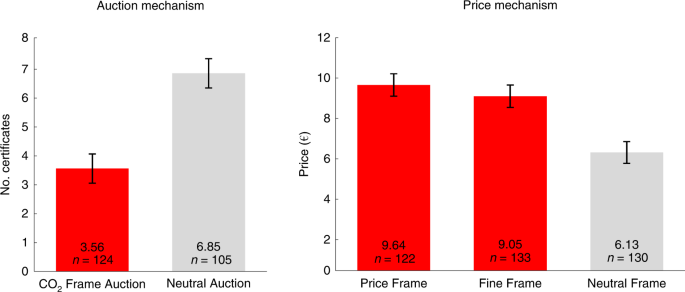
Falk, A. & Szech, N. Morals and markets. Science 340, 707–711 (2013).
Bartling, B., Weber, R. A. & Yao, L. Do markets erode social responsibility? Q. J. Econ. 130, 219–266 (2015).
Kirchler, M., Huber, J., Stefan, M. & Sutter, M. Market design and moral behavior. Manag. Sci. 62, 2615–2625 (2015).
Sutter, M., Huber, J., Kirchler, M., Stefan, M. & Walzl, M. Where to look for the morals in markets? Exp. Econ. 23, 30–52 (2020).
Page, E. A. Cashing in on climate change: political theory and global emissions trading. Crit. Rev. Int. Soc. Polit. Philos. 14, 259–279 (2011).
Sandel, M. J. What Money Can’t Buy: The Moral Limits of Markets (Farrar, Strauss and Giroux, 2012).
Ostrom, E. Coping with tragedies of the commons. Annu. Rev. Polit. Sci. 2, 493–535 (1999).
Duranton, G. & Turner, M. A. The fundamental law of road congestion: evidence from US cities. Am. Econ. Rev. 101, 2616–2652 (2011).
Friesen, L. & Gangadharan, L. Environmental markets: what do we learn from the lab? J. Econ. Surv. 27, 515–535 (2013).
Plott, C. R. Externalities and corrective policies in experimental markets. Econ. J. 93, 106–127 (1983).
Sapci, O., Wood, A. D., Shogren, J. F. & Green, J. F. Can verifiable information cut through the noise about climate protection? An experimental auction test. Climatic Change 134, 87–99 (2016).
Jakob, M., Kübler, D., Steckel, J. C. & van Veldhuizen, R. Clean up your own mess: an experimental study of moral responsibility and efficiency. J. Public Econ. 155, 138–146 (2017).
Löschel, A., Sturm, B. & Vogt, C. The demand for climate protection—empirical evidence from Germany. Econ. Lett. 118, 415–418 (2013).
Diederich, J. & Goeschl, T. Willingness to pay for voluntary climate action and its determinants: field-experimental evidence. Environ. Resour. Econ. 57, 405–429 (2014).
Diederich, J. & Goeschl, T. To mitigate or not to mitigate: the price elasticity of pro-environmental behavior. J. Environ. Econ. Manag. 84, 209–222 (2017).
Löschel, A., Sturm, B. & Uehleke, R. Revealed preferences for voluntary climate change mitigation when the purely individual perspective is relaxed – evidence from a framed field experiment. J. Behav. Exp. Econ. 67, 149–160 (2017).
Lohse, J., Goeschl, T. & Diederich, J. H. Giving is a question of time: Response times and contributions to an environmental public good. Environ. Resour. Econ. 67, 455–477 (2017).
Pigou, A. C. The Economics of Welfare (Macmillan, 1920).
Coase, R. H. The problem of social cost. J. Law Econ. 3, 1–44 (1960).
Stavins, R. N. in The New Palgrave Dictionary of Economics 2nd edn (eds Durlauf, S. & Blume, L. E.) 1778–1788 (Palgrave Macmillan, 2008).
Klenert, D. et al. Making carbon pricing work for citizens. Nat. Clim. Change 8, 669–677 (2018).
Goulder, L. H. & Schein, A. R. Carbon taxes versus cap and trade: a critical review. Clim. Change Econ. 04, 1350011–1350028 (2013).
Chichilnisky, G. & Heal, G. Who should abate carbon emissions? An international viewpoint. Econ. Lett. 44, 443–449 (1994).
Weitzman, M. L. Prices vs. quantities. Rev. Econ. Stud. 41, 477–491 (1974).
Fuss, S. et al. A framework for assessing the performance of cap-and-trade systems: insights from the european union emissions trading system. Rev. Environ. Econ. Policy 12, 220–241 (2018).
MacKay, D., Cramton, P., Ockenfels, A. & Stoft, S. Price carbon — I will if you will. Nature 526, 315–316 (2015).
Weitzman, M. L. in Global Carbon Pricing: The Path to Climate Cooperation (eds Cramton, P. et al.) Ch. 8 (MIT Press, 2017).
Cramton, P., Ockenfels, A. & Tirole, J. Policy brief—translating the collective climate goal into a common climate commitment. Rev. Environ. Econ. Policy 11, 165–171 (2017).
Kornek, U. & Edenhofer, O. The strategic dimension of financing global public goods. Eur. Econ. Rev. https://doi.org/10.1016/j.euroecorev.2020.103423 (2020).
Nordhaus, W. D. To tax or not to tax: alternative approaches to slowing global warming. Rev. Environ. Econ. Policy 1, 26–44 (2007).
Cramton, P., Ockenfels, A. & Stoft, S. in Global Carbon Pricing: The Path to Climate Cooperation (eds Cramton, P. et al.) Ch. 12 (MIT Press, 2017).
Stavins, R. N. The Future of U.S. Carbon-Pricing Policy. Environ. Energy Policy Econ. 1, 8–64 (2020).
Krishna, V. Auction Theory (Elsevier, 2002).
Becker, G. M., Degroot, M. H. & Marschak, J. Measuring utility by a single-response sequential method. Behav. Sci. 9, 226–232 (1964).
Fehr, E. & Schmidt, K. M. A theory of fairness, competition, and cooperation. Q. J. Econ. 114, 817–868 (1999).
Bolton, G. E. & Ockenfels, A. ERC: a theory of equity, reciprocity, and competition. Am. Econ. Rev. 90, 166–193 (2000).
Gollier, C. & Tirole, J. Negotiating effective institutions against climate change. Econ. Energy Environ. Policy 4, 5–28 (2015).
Source: Ecology - nature.com



